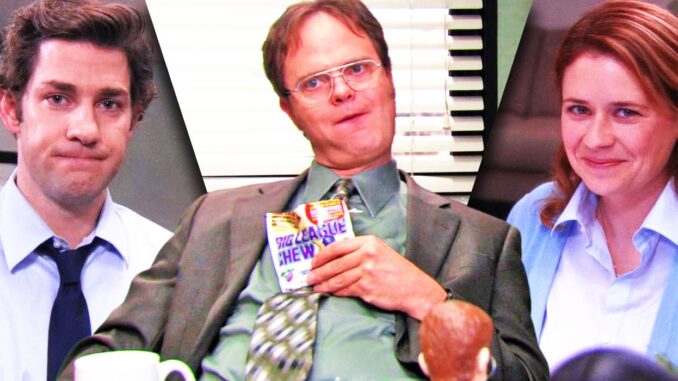
A Low Effort Prank That Totally Worked on Dwight
The office at Dunder Mifflin, Scranton, was not merely a purveyor of paper; it was a crucible of personality, a petri dish for the human condition, and, most importantly, a playground for the long-suffering prankster, Jim Halpert. His muse, his foil, his very reason for existence within those beige walls, was Dwight K. Schrute. Dwight, with his unwavering devotion to rules, his literal interpretation of reality, and his profound lack of self-awareness, was a target of unparalleled potential. And while Jim’s elaborate hoaxes often required significant ingenuity – the jello stapler, the fake red wire, the “Future Dwight” emails – some of his most glorious victories were achieved with startlingly minimal effort, leveraging Dwight’s very essence against him. One such masterpiece, deceptively simple, stands as a testament to the sheer, beautiful predictability of Dwight Schrute: The Mandatory Cognitive Recalibration Exercise.
The genesis of the prank was as mundane as a Tuesday morning in Scranton. Jim, likely nursing a lukewarm coffee and a lingering sense of ennui, overheard Dwight haranguing Michael about the “slackening of discipline” in the office. Specifically, Dwight was lamenting the rise of "mind wandering" and "peripheral distractions" that, in his expert opinion, were crippling productivity. He suggested mandatory “focus blocks” and “concentration drills.” Jim, catching only snippets through a half-closed door, saw a flicker of an idea. It wasn't about the content of Dwight's rant, but the vocabulary. Corporate jargon, official-sounding directives, a hint of pseudo-science – these were Dwight's kryptonite.
The “low effort” component of the prank was key. Jim didn't need props or confederates. He needed a computer, a printer, and a moment when Dwight was away from his desk, likely in the annex explaining proper fire safety protocols to Phyllis. Jim quickly drafted a memo, using a generic Dunder Mifflin letterhead he'd cleverly saved from a previous inter-office correspondence. The title was a triumph of bureaucratic obfuscation: “Inter-Office Directive 7G: Mandatory Cognitive Recalibration and Ocular Engagement Protocol.” The body of the memo was equally verbose, referencing vague studies on "neurological efficiency" and "sustainable ocular stamina." The core instruction, however, was simple, insidious, and utterly Dwigh-tian:
"Effective immediately, all employees are required to engage in a mandatory three-minute Cognitive Recalibration Exercise at the top of every hour. This exercise involves focusing intensely on a designated, unmoving point directly opposite your primary workstation, without moving your head, for the duration of the recalibration period. Only ocular adjustments are permitted. Peripheral awareness is to be maintained, but direct engagement is strictly prohibited. Failure to comply will result in a formal notation in your employee file regarding commitment to corporate wellness initiatives."
Jim printed the memo, folded it precisely, and slipped it onto the very top of the stack of papers on Dwight’s desk, right under his “Assistant (to the) Regional Manager” nameplate. He then returned to his own desk, a casual smile playing on his lips, and waited.
The trap sprung precisely at 9:00 AM. As the clock on the wall chimed, Dwight, ever-punctual, ever-diligent, straightened his posture. Jim watched from the corner of his eye as Dwight pulled the memo from his stack, his brow furrowing with a mixture of confusion and civic duty. He read it, then re-read it, his lips silently mouthing the corporate jargon. He glanced suspiciously around the office. No one else was standing. No one else was staring. Jim continued to type, occasionally glancing up with an expression of feigned concentration.
Then, with an audible sigh of commitment, Dwight rose. He turned his chair precisely, ensuring his desk was directly opposite a rather unremarkable section of the wall beside the copier. He then assumed a rigid, almost military, posture, his head fixed forward, eyes wide and unblinking. For three long minutes, Dwight Schrute stood utterly still, his eyes darting frantically back and forth, left and right, up and down, as if scanning for invisible data points on the beige plaster. His brow was furrowed in intense concentration, a vein throbbing faintly in his temple. He was, quite literally, performing "ocular adjustments" while attempting to maintain "peripheral awareness."
The office, initially oblivious, slowly took notice. Phyllis exchanged a bewildered glance with Oscar. Stanley merely snorted into his crossword. But Pam caught Jim’s eye, a silent explosion of shared amusement passing between them. The beauty of it was Jim didn't have to say a word. He didn't have to nudge anyone. Dwight, in his sincere, unwavering commitment to the arbitrary, had become his own punchline.
At 9:03 AM, Dwight sat down with a definitive thud, letting out a frustrated grunt. He then spent the next five minutes glowering at Jim, no doubt mentally composing a report to corporate about the "lack of adherence to essential wellness protocols." At 10:00 AM, precisely, he stood again, a flicker of internal protest battling with his ingrained obedience. He repeated the ridiculous exercise, his eyes darting even more frantically, as if trying to will his peripheral vision to expand. It wasn't until Michael, observing the bizarre tableau, innocently asked, "Dwight, are you… having a staring contest with the wall?" that the façade truly crumbled. Dwight, mortified, finally realized he had been duped. The subsequent rage was magnificent, but the memory of him, standing rigidly, eyes bugging out, staring at a blank wall, was the true prize.
The Mandatory Cognitive Recalibration Exercise was a triumph of low-effort pranking. It required no elaborate setup, no complex technology, just a keen understanding of Dwight’s psychological architecture. It worked because Dwight, at his core, was a man who believed in systems, in authority, and in the absolute literal truth of the written word. Jim simply provided the written word, however absurd, and watched as Dwight, with earnest, painstaking diligence, unraveled himself. It was a perfect, understated illustration of the enduring, beautiful chaos that Dwight Schrute brought to the mundane world of paper sales.